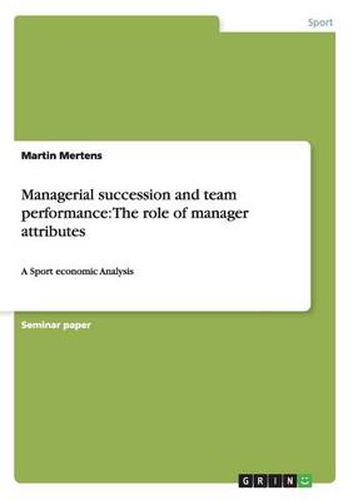Managerial succession and team performance: The role of manager attributes: A Sport economic Analysis
Martin Mertens

Managerial succession and team performance: The role of manager attributes: A Sport economic Analysis
Martin Mertens
Seminar paper from the year 2011 in the subject Sport - Sport Economics, Sport Management, grade: 2,7, Bielefeld University (Abteilung Sportwissenschaft), course: OEkonomische Fragen von Mannschafts- und Individualsportarten, language: English, abstract: Michael Owen’s statement above shows the point of view of a player after manageri-al succession. With a new manager coming, the atmosphere in a team is tense. The player’s skills are reassessed and their position in the team is insecure. It becomes necessary to demonstrate some strength and impress the new manager. A strained situation for everyone involved, not just the players. Owen’s remark then naturally does not take into account the manager’s point of view and how he might perceive a team and react to the disruptive effects of succession. In sports, managers perform several functions which are often deemed critical to the performance of organizations. Therefore, when teams perform poorly, there is a common notion that managerial succession and replacing the manager will lead to improved performance. In spite of numerous studies and ongoing attention to this interesting phenomenon, the effect of managerial successions on team performances remains a debated issue. Related to this issue is the investigation of the impact of a manager’s attributes, such as ability or experience. Do managerial skills affect team performance, and if so, how can these attributes be assessed? The results of such studies might solidify an evaluation of a manager’s work when carefully distinguishing between the manager’s contribution to team success or failure and the team’s own performance. As such, investigations like those studied in this paper might help to break the today often criticized habit of hiring and firing a manager solely based on won-loss balances. Obviously, there is still a need to investigate this phenomenon in greater detail in a theoretical and empirical way.
This item is not currently in-stock. It can be ordered online and is expected to ship in approx 2 weeks
Our stock data is updated periodically, and availability may change throughout the day for in-demand items. Please call the relevant shop for the most current stock information. Prices are subject to change without notice.
Sign in or become a Readings Member to add this title to a wishlist.


